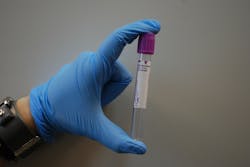Simple blood test can predict severity of COVID-19 for some patients
An early prognosis factor that could be a key to determining who will suffer greater effects from COVID-19, and help clinicians better prepare for these patients, may have been uncovered by researchers at The University of Texas Health Science Center at Houston (UTHealth). Results of the findings were published in the International Journal of Laboratory Hematology.
The severity of COVID-19 infections can range from little or no symptoms for some patients to fighting for their lives in the intensive care unit (ICU) for others. Little is known about what causes these differences.
“Because of the uncertainty surrounding the implications of this virus, we knew there needed to be a prognostic factor that could aid hospital workers in managing COVID-19,” said Ahmad Farooq, MD, corresponding author on the study, and assistant professor of gastroenterology at McGovern Medical School at UTHealth. “In this study, we discovered evidence of a relationship between lymphocytopenia and disease severity that could really help clinicians prepare for critically ill patients.”
Lymphocytopenia is the condition of having an abnormally low levels of white blood cells, called lymphocytes, which are key components of the immune system. Using a cohort of 57 patients from a local Houston hospital, researchers analyzed basic, clinical, and laboratory data from a simple blood draw and found that patients who were admitted into an ICU showed signs of lymphocytopenia compared to patients who were not in the ICU.
“Lymphocytopenia is known to be common in many viral illnesses, in particular other coronaviruses including Severe Acute Respiratory Syndrome coronavirus (SARS-CoV) and Middle Eastern Respiratory Syndrome coronavirus (MERS-CoV),” said Jason Wagner, MD, lead author on the study and internal medicine resident at McGovern Medical School. “However, few studies have determined if lymphocytopenia found at the time of admission to the hospital is helpful in understanding the course of the disease.”
At the time of hospital admission, patients who ended up in the ICU had lymphocytopenia in comparison to those not needing ICU admission, revealing that blood lymphocyte count could be a predictive marker in identifying who may be admitted into the ICU and suffer severe implications. Additionally, researchers found that patients with lymphocytopenia were more likely to develop an acute kidney injury (AKI) during admission. According to Farooq, mortality rates are higher in patients who have both COVID-19 and AKI compared to those without AKI.
“The finding of an association with AKI warrants further research. Nevertheless, it is apparent here that lymphocytopenia may serve as a prognostic marker for AKI in patients with COVID-19,” Farooq said.

